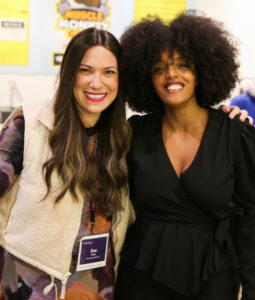By Andrew Adler
Community Editor
Two remarkable women – Eve Levy and Ashager Araro – visited the Trager Family JCC Nov. 16 representing Momentum on the Road –Strengthening Jewish Identity as a Key to Addressing Antisemitism – a touring component of an Israeli-based program that aims “to empower women to change the world through Jewish values that transform ourselves, our families, and our communities.”
Possessing unbounded, incandescent energy, they spoke to several dozen women gathered in the Fleischaker-Greene Family Community Room in what was part pep rally, part consciousness raising. A fair number of audience members had participated in Momentum trips to Israel, where they engaged with Israelis alongside the Momentum principle of fostering “unity without uniformity.”
“We took our first group back in 2016 to Israel for I don’t know – eight days?” Lenae Price, a former Momentum trip leader who is Chief Capital Campaign Officer at the Jewish Federation of Louisville and the Trager Family JCC, told Monday’s listeners.
“It ran together, but in the best kind of way – like you were drinking from a hose and it was all delicious,” Price said. “When we first got there, there were 700 women from all over the world, and they gave us these bracelets that say, ‘Don’t blame; don’t complain.’ – which is pretty funny, because when you get 700 Jewish moms together, we all have one thing in common – which is we sometimes blame and complain.”
There was no sign of kvetching on this Monday evening. Certainly not from Levy, a Momentum educator who after living in the Canadian cities of Montreal, Calgary, plus Denver, Portland – and a dozen years in Jerusalem – settled with her family in the Chicago suburb of Deerfield, Ill., where she is the director of the L’Chaim Center.
As the granddaughter of four Holocaust survivors, her story could hardly have been more personal.
“None of us will ever forget when we heard the news of October 7,” she told her listeners. “And on October 8, people started calling me saying, ‘Eve, you have to rally the community together. We need a prayer rally. We need you to give us some direction.’ And I was so lost. I was struggling. I was in a place of fear, of generational trauma coming from my upbringing with my grandparents. How on earth was I supposed to give any perspective on what was happening in the world?”
Still, “I remember I had to do it. So we said for the community to come at 8 o’clock to our center – and over 150 people came, and the news stations came – and here I was, not sure what to say. There were no words. I remember going to a side room, and I took out a notebook, which became my diary. I started writing in it every single day for the last 14 months. I wrote things like, ‘If I want to see peace, I need to make peace.’”
Like Levy, Araro praised Momentum for how it intrinsically values diversity and inclusiveness.
“What I love about this organization,” Aaro said, “is that it brings Jewish people from different communities, different walks of life and beliefs of Jewish identity, so none of need to compromise about who we are and what we believe.”
As an Israeli activist of Ethiopian heritage, she learned early on how to straddle parallel ethnic worlds. Despite rising to the rank of captain in the Israel Defense Forces reserves, there were times when her dark skin and Jewish faith made her something of a puzzlement.
“Then the brave one – or people with nerve – will ask me, ‘What are you? Are you Black or Jewish?’– because in their understanding, one must come at the expense of the other. I say, ‘No, I’m both Black and Jewish’ – and the come back and say, ‘Yeah, yeah, yeah, whatever.’
Her mother and father confronted similar, vexing contradictions.
“My parents lived in a majority-Black country,” Araro explained. “They look like any other black person in Ethiopia – you couldn’t tell them apart. But their Black skin didn’t protect them from antisemitism. They were always looked at and treated as Jews. They never could be Ethiopian enough.”
Today, “I live in a majority-Jewish country, but my Jewish identity doesn’t protect me from racism. So when people ask me to choose, I say ‘I refuse to choose,’ because I don’t have the privilege to do so.”
Ultimately, Aaro says, “I have a clear understanding that the way I live my life right now in Israel today is the fulfillment of my ancestor dream. People have died, sacrificed, and bled for me to live the life that I’m living right now. So, there is no way in hell – sorry — that I’m going to change or give up my Jewishness. I will always fight both antisemitism and racism with the same force, because I’m 100 percent black and 100 percent Jewish.”




